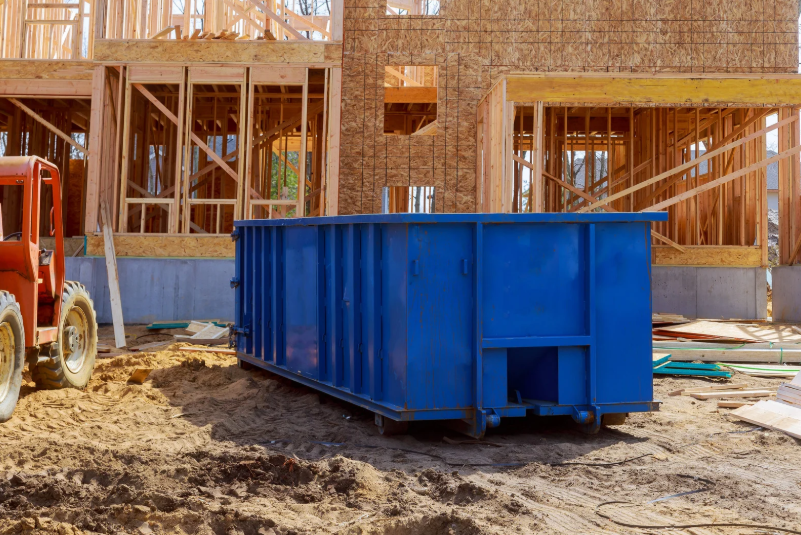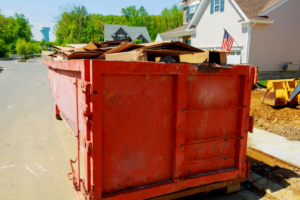
Every construction site pulses with motion, energy, and debris. Piles rise, walls fall, and through it all, waste sneaks in with every nail and board. It’s not just rubble—it’s the residue of transformation. Contractors often underestimate the volume of waste generated during framing, demolition, or even minor renovations. Miscalculating this can leave a project site bloated with remnants that stall progress and stifle efficiency. Waste piles up fast, taking up valuable space that could be used for equipment or materials, and creating tripping hazards or environmental concerns.
Renting a construction dumpster turns chaos into control. It isn’t glamorous, but it’s strategic. When waste has a designated space to vanish into, timelines breathe easier. That flow matters. It’s about keeping momentum, ensuring the job site stays nimble, and avoiding the mess that slows crews down. Dumpster rental, in essence, is groundwork for success.
Placement Plays a Bigger Role Than You’d Expect
When it comes to dumpster rentals, placement is often overlooked, but it can make or break a construction project. The wrong location can cause significant delays and safety hazards. A dumpster placed too far from the worksite can lead to unnecessary labor as workers must carry debris further than necessary. On the other hand, placing a dumpster too close to active work areas can block access to equipment, create tripping hazards, or obstruct pathways, leading to inefficiencies. Additionally, poorly positioned dumpsters can damage pavement or landscaping, adding to overall project costs.
Factors such as space constraints, traffic patterns, and proximity to ongoing work should all influence where the dumpster is placed. In urban areas, consideration for local ordinances or neighborhood concerns may also be essential. Contractors who think strategically about placement make the construction process smoother. They prevent logistical nightmares and ensure a safer, more organized work environment, saving both time and money.

Dumpster Timing Can Make or Break the Schedule
In construction, every minute counts. A well-timed dumpster rental can be the difference between smooth operations and costly delays. Waste removal needs to align perfectly with the stages of construction, as any disruption can throw off the project’s rhythm. For example, when demolition begins, the dumpster should be on-site and ready to absorb debris. If the delivery is late, debris piles up, creating clutter and hazards that delay progress. Similarly, once framing is complete, another dumpster might be needed to accommodate the new waste.
Contractors with foresight schedule dumpster pickups and exchanges in sync with their construction timeline. Poor timing can lead to dead time—when a dumpster is full and no replacement is scheduled, work must halt until a new one arrives. Proper timing also ensures that dumpsters are swapped out or removed promptly, keeping the worksite clean and avoiding the costly disruption of waiting for waste removal services.
Understanding What Can’t Go In Keeps You Compliant
The last thing any contractor wants is to incur penalties or delays because of improper waste disposal. Not all construction waste is created equal, and certain materials, such as hazardous chemicals, asbestos, or certain electronics, should never be placed in a standard dumpster. Ignoring these regulations can lead to hefty fines, and even worse, potential environmental harm. In many cases, these materials require specialized disposal services, which can add complexity to a project’s waste management plan.
Contractors must stay informed about local disposal laws and work with dumpster rental providers who offer guidance on what can and cannot go in the dumpster. Being proactive about material sorting not only ensures compliance but also fosters responsible waste management. A contractor who understands the ins and outs of disposal regulations builds a reputation for professionalism and reliability. They protect both the project and the environment, ensuring smooth, penalty-free progress throughout the job.
Clean Sites Build Faster Than Dirty Ones
A messy construction site can be more than just an eyesore—it can be a productivity killer. Loose boards, stray nails, and discarded materials create obstacles that workers must constantly navigate around. This slows down the entire operation, leading to frustration and inefficiencies. Additionally, inspectors and clients may take notice of a cluttered site, associating disorder with poor management and potentially causing delays in approvals or project timelines. A clean site, on the other hand, conveys professionalism, boosts morale, and fosters a safer environment.
When the waste has a designated spot in a well-maintained dumpster, workers can focus on the task at hand without worrying about debris piling up around them. By consistently removing waste from the site, contractors can ensure that tools and equipment remain accessible, and that everyone’s attention stays on productivity. Clean sites also reduce the risk of accidents, improving safety for the crew and ensuring the project progresses on schedule, all while maintaining a high standard of professionalism.
Multiple Projects Demand Scalable Dumpster Solutions
When managing multiple construction sites, a one-size-fits-all approach to waste disposal simply won’t work. Each project has unique needs based on its size, scope, and the type of materials being handled. Some sites may require smaller 10-yard dumpsters, while larger projects may need 30-yard containers to handle the volume of debris. Coordinating waste management for several projects involves understanding each site’s demands and ensuring that the right size dumpsters are in place at the right time. Scalable dumpster solutions are crucial for contractors juggling multiple jobs simultaneously, as they provide flexibility to meet varying needs without wasting resources.
Timely dumpster delivery and pickup also become more complicated when managing multiple sites, requiring close attention to logistics. A contractor with a clear waste strategy—one that includes scalable dumpster solutions and effective scheduling—can ensure smooth operation across all sites, preventing delays, maintaining project momentum, and keeping costs under control. It’s about having the right tools in place to support multiple moving parts.
Local Ordinances Can Trip You Up Without Warning
Construction sites often operate in areas governed by strict municipal regulations, and dumpsters are no exception. Local ordinances can dictate where dumpsters can be placed, how long they can remain on-site, and even what type of waste they can hold. Failing to follow these rules can result in fines, penalties, or forced relocation of the dumpster, all of which can cause major disruptions to the project’s timeline. Understanding these local laws is critical for contractors who want to avoid unforeseen setbacks.
In some cases, contractors may need to obtain a permit for placing a dumpster on public property or in areas with heavy foot traffic. Restrictions may also apply to certain streets or residential areas, limiting where dumpsters can be placed. By taking the time to research and comply with local regulations, contractors can prevent unnecessary interruptions and keep the project running smoothly. It’s an important part of project planning that ensures no legal or logistical surprises derail progress.
Dumpster Safety Is Everyone’s Responsibility
Safety on a construction site is everyone’s job, and dumpsters are no exception. A dumpster that is improperly loaded or placed can become a dangerous hazard. Overloaded dumpsters can cause spills, while improperly packed containers can create tipping risks. Additionally, sharp or protruding debris, such as nails or metal scraps, pose a risk to workers and passersby. Properly loading and maintaining the dumpster is essential to ensuring that it remains safe throughout the project. Contractors should train their crews to distribute weight evenly, close lids when possible, and keep pathways clear.
Regular inspections of the dumpster’s contents and condition are also necessary to prevent accidents. When dumpsters are treated with the same care as other heavy equipment, such as cranes or saws, the risk of injury decreases, and overall project safety improves. A safe work environment isn’t just about compliance; it’s about creating a culture of respect for every piece of equipment, ensuring that the entire crew can work without fear of preventable accidents.
Choosing the Right Partner Means Everything
Selecting the right dumpster rental partner is a decision that shouldn’t be taken lightly. Contractors need a provider who understands the demands of construction projects and can offer flexible, responsive service to match. A good dumpster rental partner goes beyond simply delivering and picking up containers—they take the time to understand the specific needs of the job, helping to choose the right size, placement, and timing for waste removal.
They should be able to adapt quickly to any changes in the schedule and offer guidance on compliance with local waste disposal laws. Reliability is key; a great partner delivers dumpsters when they’re needed and ensures timely pickups to avoid disruptions. Communication is also crucial—contractors need a provider who is available to troubleshoot and respond to urgent needs. The right rental partner makes a contractor’s job easier, streamlining the waste management process and allowing the team to focus on building rather than dealing with waste issues.
Conclusion
In the demanding world of construction, dumpster rentals become a behind-the-scenes hero when managed properly. They’re not just about throwing away debris—they’re about staying organized, adhering to regulations, and maintaining the flow of a project. Contractors need to understand local compliance laws, ensuring that waste is disposed of correctly, and scaling dumpster solutions for multi-site projects to avoid delays or inefficiencies. Additionally, keeping a clean and safe site is crucial for worker productivity and safety.
Contractors who take waste management seriously often experience smoother, faster, and cleaner projects with fewer disruptions. If you’re in need of a reliable partner who understands the nuances of construction site cleanup, reach out to 606 Junk Removal and Dumpster Rental, proudly serving Chicago, IL. Whether it’s for small renovations or large-scale builds, they offer efficient, responsive, and contractor-friendly dumpster solutions. Contact them at 773-412-4902 or via email at info@606junk.com for hassle-free, professional service that keeps your project on track and running smoothly.
